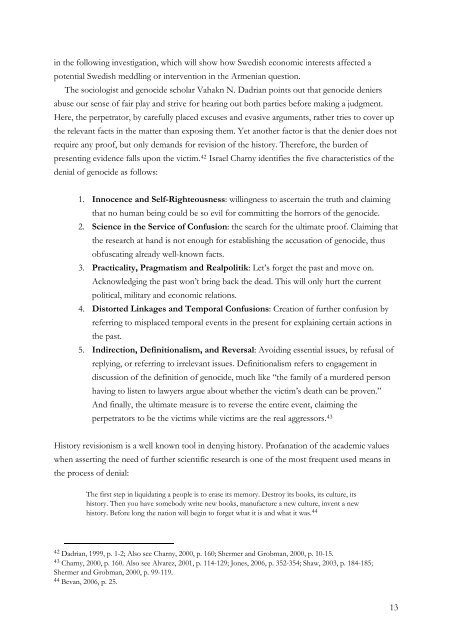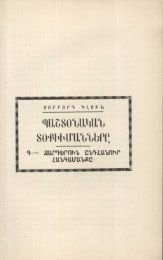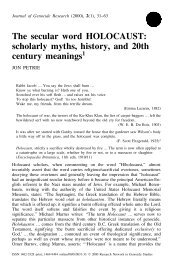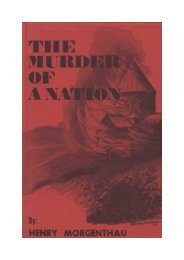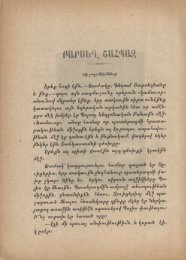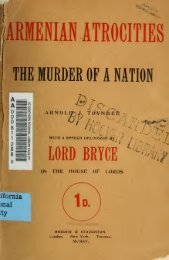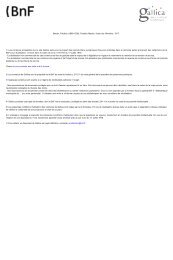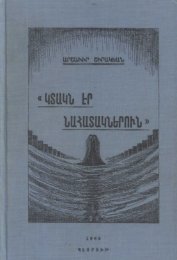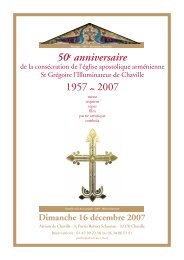altered the existing society where the previous order was replaced by totalitarian regimes (e.g. thecases of Young Turks and Nazis). These events were then often followed by a period of globalwar where large scale massacres of the victimised groups were implemented under cover ofwar. 35 This paper will try to search for and identify these factors in the studied material in orderto answer the first question about whether the above mentioned theoretical model of genocide isapplicable on the Armenian massacres fr<strong>om</strong> the Swedish material’s point of view. What isrelevant here, are the key words “eli<strong>min</strong>ation”, “annihilation”, and “exter<strong>min</strong>ation” of the“Armenian nation”, or the “Armenian race”, and “state orchestrated” actions, which will be usedto indicate how the Armenian massacres were described in Sweden, but especially by Swedishrepresentatives in Ott<strong>om</strong>an Turkey.The genocide is consummated by its final stage: denial. Israel Charny calls it “an attack on thecollective identity and national cultural continuity of the victim people”. 36 Richard G.Hovannisian argues:Following the physical destruction of a people and their material culture, memory is all that is leftand is targeted as the last victim. C<strong>om</strong>plete annihilation of a people requires the banishment ofrecollection and the suffocation of remembrance. Falsification, deception, and half-truths reducewhat was to what may have been or perhaps what was not at all. 37Genocide scholar and political theorist, Roger W. Smith, writes: “Memory, in any case,requires renewal.” By resorting to denial and suppression of any discussion about the c<strong>om</strong>mittedcrimes, the perpetrator uses “silence where possible and dipl<strong>om</strong>acy when necessary to erode theremaining traces of the once c<strong>om</strong>mitted genocide. 38Denial could be seen as a highly human behaviour, namely as a defence mechanism. 39 Bydenial, the perpetrators suppress the horrors and refuse the guilt for c<strong>om</strong>mitting an act, probablythe most despised crime in modern time, which they condemn in public. Genocide denial,however, is not limited to the perpetrator alone. A third party could also rely on denial of anongoing genocide, or one already implemented, in order to “avoid responsibility for doings<strong>om</strong>ething about it… Thus, the Clinton ad<strong>min</strong>istration resisted labelling the Rwandan genocideof 1994 as ‘genocide’ in order to avoid having to bec<strong>om</strong>e directly involved in trying to stop it orpunish the perpetrators.” 40 Another key factor, closely related to the latter category, is theinteraction of humanitarian intervention and political and econ<strong>om</strong>ic gains. An intervention in anact of genocide would endanger the good relations with the perpetrating state, thus jeopardisingthe benefits of ongoing or future econ<strong>om</strong>ic and trade exchanges. 41 This is one of the key factors35 Alvarez, 2001 p. 30; Melson, 1992.36 Charny, 2000, p. 159.37 Hovannisian, 1999, p. 202. Also see Bevan, 2006, p. 25; Shaw, 2003, p. 119-120.38 Smith, 1992, p. 3, 8.39 Suedfeld and Schaller, 2002, p. 6940 Charny, 2000, p. 159; Staub, New Jersey, 2002, p. 26.41 Charny, 1994, p. 67-68; Staub, New Jersey, 2002, p. 26.12
in the following investigation, which will show how Swedish econ<strong>om</strong>ic interests affected apotential Swedish meddling or intervention in the Armenian question.The sociologist and genocide scholar Vahakn N. Dadrian points out that genocide deniersabuse our sense of fair play and strive for hearing out both parties before making a judgment.Here, the perpetrator, by carefully placed excuses and evasive arguments, rather tries to cover upthe relevant facts in the matter than exposing them. Yet another factor is that the denier does notrequire any proof, but only demands for revision of the history. Therefore, the burden ofpresenting evidence falls upon the victim. 42 Israel Charny identifies the five characteristics of thedenial of genocide as follows:1. Innocence and Self-Righteousness: willingness to ascertain the truth and clai<strong>min</strong>gthat no human being could be so evil for c<strong>om</strong>mitting the horrors of the genocide.2. Science in the Service of Confusion: the search for the ultimate proof. Clai<strong>min</strong>g thatthe research at hand is not enough for establishing the accusation of genocide, thusobfuscating already well-known facts.3. Practicality, Pragmatism and Realpolitik: Let’s forget the past and move on.Acknowledging the past won’t bring back the dead. This will only hurt the currentpolitical, military and econ<strong>om</strong>ic relations.4. Distorted Linkages and Temporal Confusions: Creation of further confusion byreferring to misplaced temporal events in the present for explaining certain actions inthe past.5. Indirection, Definitionalism, and Reversal: Avoiding essential issues, by refusal ofreplying, or referring to irrelevant issues. Definitionalism refers to engagement indiscussion of the definition of genocide, much like “the family of a murdered personhaving to listen to lawyers argue about whether the victim’s death can be proven.”And finally, the ultimate measure is to reverse the entire event, clai<strong>min</strong>g theperpetrators to be the victims while victims are the real aggressors. 43History revisionism is a well known tool in denying history. Profanation of the academic valueswhen asserting the need of further scientific research is one of the most frequent used means inthe process of denial:The first step in liquidating a people is to erase its memory. Destroy its books, its culture, itshistory. Then you have s<strong>om</strong>ebody write new books, manufacture a new culture, invent a newhistory. Before long the nation will begin to forget what it is and what it was. 4442 Dadrian, 1999, p. 1-2; Also see Charny, 2000, p. 160; Shermer and Grobman, 2000, p. 10-15.43 Charny, 2000, p. 160. Also see Alvarez, 2001, p. 114-129; Jones, 2006, p. 352-354; Shaw, 2003, p. 184-185;Shermer and Grobman, 2000, p. 99-119.44 Bevan, 2006, p. 25.13
- Page 3 and 4: 1 Introduction.....................
- Page 5 and 6: War, rather confirm the version of
- Page 7 and 8: 1.2 Previous ResearchWhen discussin
- Page 9 and 10: Military Attaché and the missionar
- Page 11: situation: “It is a crime when Te
- Page 15 and 16: killed. The slaughterer slaughtered
- Page 17 and 18: interests. Despite his famous “14
- Page 19 and 20: morality, balance of power, or the
- Page 21 and 22: 4. International organisations (e.g
- Page 23 and 24: warring parties. 104 This observati
- Page 25 and 26: Concerning the protocols of the Swe
- Page 27 and 28: present in Turkey. These documents
- Page 29 and 30: He also mentions meeting an Armenia
- Page 31 and 32: the annihilation. General von Losso
- Page 33 and 34: 1.5 BackgroundIn order to understan
- Page 35 and 36: 1914, when two inspector-generals f
- Page 37 and 38: to Islam or were sold as slaves to
- Page 39 and 40: 2 Empirical AnalysisThe empirical r
- Page 41 and 42: It does not seem to be the Turkish
- Page 43 and 44: The Turks claim that, at the Russia
- Page 45 and 46: The Armenian population has equippe
- Page 47 and 48: 1917 was the revival year for the A
- Page 49 and 50: Even if the communication between t
- Page 51 and 52: implemented against the Armenian na
- Page 53 and 54: Anckarsvärd continued claiming tha
- Page 55 and 56: Germany is blamed for its accessory
- Page 57 and 58: Here Wirsén took the liberty to co
- Page 59 and 60: On February 19, news of new Armenia
- Page 61 and 62: estricted to the fields of intrigue
- Page 63 and 64:
generous offer of President Wilson
- Page 65 and 66:
Lange gave a detailed description o
- Page 67 and 68:
skin was totally scorched. Another
- Page 69 and 70:
which her recurrently emphasised th
- Page 71 and 72:
The sooner calls referring to the A
- Page 73 and 74:
Despite these facts, Armenia was th
- Page 75 and 76:
Svenska Riksarkivet [Swedish Nation
- Page 77 and 78:
Bakhtiari, Kalla det vad fan du vil
- Page 79 and 80:
Chan, Steve and Drury, Cooper A., S
- Page 81 and 82:
Moranian, Suzanne Elizabeth, Bearin


